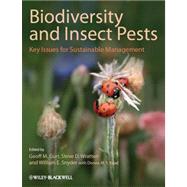
Note: Supplemental materials are not guaranteed with Rental or Used book purchases.
Purchase Benefits
What is included with this book?
Steve Wratten is Professor of Ecology at Lincoln University, New Zealand and Visiting Professor at Charles Sturt University in Australia. His main research concerns evaluating and enhancing "nature's services" (ecosystem services). Using resource economics techniques, the existing value of these services (such things as biological control of pests) is estimated and then habitat manipulation ("ecological engineering") is used to enhance these services on farmland to provide profit and real evidence of sustainability. This work is done across several agricultural sectors but especially in vineyards.
William Snyder is Professor of Entomology at Washington State University, USA. With the help of a small army of students and postdocs, he explores the relationship between biodiversity and biocontrol. Recent work focuses on the relative importance of the two components of biodiversity, species number (richness) and species balance (evenness), and practical ways for farmers to harness biodiversity's many benefits.
Donna Read is a Research Assistant at Charles Sturt University, Australia with interests in rural sociology, agricultural economics and horticulture.
| Preface | p. vii |
| Foreword | p. ix |
| Contributors | p. x |
| Introduction | p. 1 |
| Biodiversity and insect pests | p. 3 |
| Fundamentals | p. 21 |
| The ecology of biodiversity–biocontrol relationships | p. 23 |
| The role of generalist predators in terrestrial food webs: lessons for agricultural pest management | p. 41 |
| Ecological economics of biodiversity use for pest management | p. 57 |
| Soil fertility, biodiversity and pest management | p. 72 |
| Plant biodiversity as a resource for natural products for insect pest management | p. 85 |
| The ecology and utility of local and landscape scale effects in pest management | p. 106 |
| Methods | p. 121 |
| Scale effects in biodiversity and biological control: methods and statistical analysis | p. 123 |
| Pick and mix: selecting flowering plants to meet the requirements of target biological control insects | p. 139 |
| The molecular revolution: using polymerase chain reaction based methods to explore the role of predators in terrestrial food webs | p. 166 |
| Employing chemical ecology to understand and exploit biodiversity for pest management | p. 185 |
| Application | p. 197 |
| Using decision theory and sociological tools to facilitate adoption of biodiversity-based pest management strategies | p. 199 |
| Ecological engineering strategies to manage insect pests in rice | p. 214 |
| China's 'Green Plant Protection' initiative: coordinated promotion of biodiversity-related technologies | p. 230 |
| Diversity and defence: plant–herbivore interactions at multiple scales and trophic levels | p. 241 |
| 'Push–pull' revisited: the process of successful deployment of a chemical ecology based pest management tool | p. 259 |
| Using native plant species to diversify agriculture | p. 276 |
| Using biodiversity for pest suppression in urban landscapes | p. 293 |
| Cover crops and related methods for enhancing agricultural biodiversity and conservation biocontrol: successful case studies | p. 309 |
| Synthesis | p. 329 |
| Conclusion: biodiversity as an asset rather than a burden | p. 331 |
| Index | p. 340 |
| Table of Contents provided by Publisher. All Rights Reserved. |
The New copy of this book will include any supplemental materials advertised. Please check the title of the book to determine if it should include any access cards, study guides, lab manuals, CDs, etc.
The Used, Rental and eBook copies of this book are not guaranteed to include any supplemental materials. Typically, only the book itself is included. This is true even if the title states it includes any access cards, study guides, lab manuals, CDs, etc.